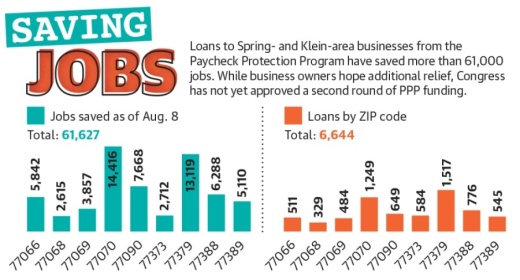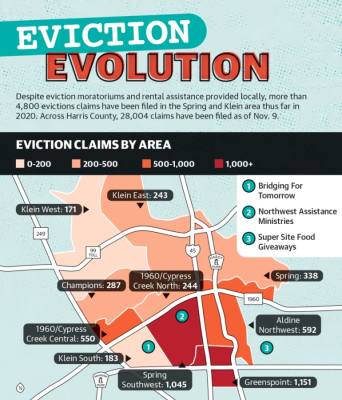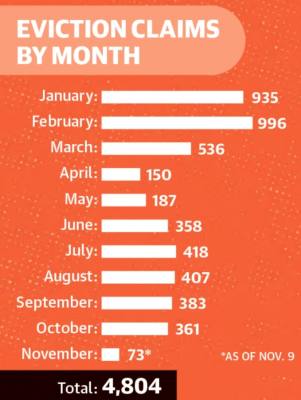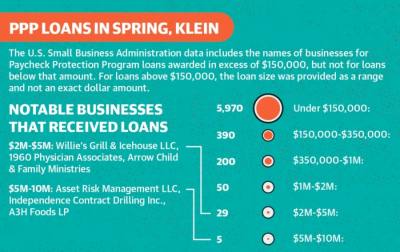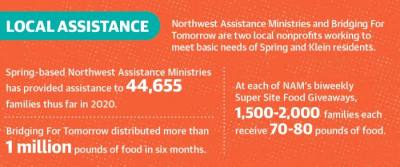Throughout the pandemic, Spring-based Northwest Assistance Ministries has provided assistance to more than 44,600 families through its programs including Meals on Wheels, Emergency Basic Needs, the Joanne Watford Nutrition Center and Super Site Food Giveaways. This compares with 33,600 families served in all of 2019.
At the same time, unemployment claims are continuing to outpace last year’s numbers, according to Texas Workforce Commission data, with 6,721 claims filed in Harris County the week of Oct. 25-31 and 2,406 claims filed that same week in 2019.
Additionally, as eviction claims in the Spring and Klein area start to pick back up, NAM Chief Advancement Officer Brian Carr said the economic outlook remains bleak for many local residents and businesses.
“What we’re seeing out in the community is really a greater sense of hopelessness than we saw even after [Hurricane] Harvey,” Carr said.
In addition to Paycheck Protection Program loans provided through the U.S. Small Business Administration and assistance provided through local nonprofits, Harris County has also launched programs to support residents. However, local officials said the need for these programs far outweighed the allotted funding, resulting in application periods being short lived and long gone.
“COVID[-19] has gone on much longer than anybody has expected it to, and ... there doesn’t seem to be any end in sight,” said Bobby Lieb, the president and CEO of the Houston Northwest Chamber of Commerce. “For as long as we’re living under some constraints out of fear for the public health, it’s going to have a negative effect on the economy.”
Meeting basic needs
Since the onset of the pandemic in March, Carr said NAM has seen a 75%-100% increase in the number of people visiting its food pantry on a weekly basis and lines wrapping around the nonprofit’s building to apply for rent and mortgage assistance.
To meet the community’s increased needs, the nonprofit partnered with the Houston Food Bank to give away food every two weeks at Ecopark-IAH near the George Bush Intercontinental Airport, during which Carr said 1,500-2,000 families each receive 70-80 pounds of food.
Additionally, NAM plans to provide holiday meals and toys for more than 5,200 children this year, compared to 1,773 children served in 2019. Carr said meeting such a high demand will only be sustainable with continued community support.
“We know that rent and food assistance and helping families get through the holidays are going to be our top priorities through the end of the year,” Carr said.
Several other nonprofits are helping residents during the pandemic. Bridging For Tomorrow distributed more than 1 million pounds of food in six months; by comparison, the nonprofit distributed 13,000 pounds of food in all of 2019.
Executive Director Christy Sprague said when the pandemic first hit, the demand for goods quickly outgrew the food pantry’s supply.
“We did have to turn people away. It’s a terrible feeling to run out of food,” Sprague said. “Finally we realized that no matter how much food we ordered, it would run out.”
However, after the National Guard was assigned to assist Bridging For Tomorrow in April, Sprague said the nonprofit is now on its way to distributing 2 million pounds this year.
“The way this community has come together is the only reason we are able to do this week after week,” she said. “We’re ready for it now. We’re here for the long haul.”
County support
At the county level, Harris County Commissioners Court established several assistance programs for those in need, including a $4.7 million Childcare Assistance Program and a $2.6 million Workforce Development Program in late September.
According to Harris County Judge Lina Hidalgo, the Childcare Assistance Program will help fund after-school programs, distance learning and child care for essential workers, and funds will be distributed through Collaborative for Children, United Way Bright Beginnings and the YMCA.
The Workforce Development Program will assist Harris County residents with training, job search and work-readiness support. These funds will be distributed through SERJobs, Lone Star College, Capital IDEA Houston, WorkTexas at Gallery Furniture, Goodwill of Houston and Alliance Community Assistance Ministries of Greater Houston.
Meanwhile, the Harris County COVID-19 Emergency Direct Assistance Fund, for which applications were accepted Nov. 2-6, is expected to help 33,333 families with one-time payments of up to $1,200. The fund is being managed by the Catholic Charities of the Archdiocese of Galveston-Houston.
“Thousands of families across Harris County have struggled to overcome the financial damage from COVID-19,” Hidalgo said. “While this relief will not reach everyone who needs it, we must do everything in our power to help those who are vulnerable pull through.”
Harris County, Houston and nonprofit BakerRipley also partnered in mid-August to launch a $60 million rental assistance program to help curb evictions for county residents who are behind on payments. At the same time, the Texas Supreme Court has implemented eviction moratoriums throughout the pandemic to provide additional relief.
As a result, eviction claims in the Spring and Klein area dropped from 996 filed in February to 536 filed in March and again to a low of 150 filed in April, according to data analytics firm January Advisors. However, eviction claims began to pick back up in the summer, and despite local efforts, 4,804 eviction claims have been filed in 2020 as of Nov. 9, January Advisors data shows. Eviction data for 2019 was not available.
Staying on payroll
In addition to residents, local businesses are also still struggling. According to SBA data, 6,644 PPP loans were awarded as of Aug. 8 to businesses and organizations across the nine Spring- and Klein-area ZIP codes, saving 61,627 jobs. The loans allowed business owners to make crucial rent payments and continue paying staff.
However, as loan money runs out, some business owners said they are hoping for another round of funding.
“It seems like more people are actually coming out now, but it’s been inconsistent and in waves,” said Mario Buitron, the manager at The Annex Crafthouse in Vintage Park.
According to SBA data, 53 jobs were retained at The Annex Crafthouse, which opened in September 2019.
“It’s helped us tremendously because we have a pretty high rent bill, too,” Buitron said. “We’re a brand-new restaurant, so once we started getting going, our sales started losing to COVID[-19] in March.”
Also a PPP recipient, NAM received about two months of payroll totaling $700,000, which allowed the nonprofit to retain its 87 employees.
“[The PPP loan] allowed us to keep all of our staff so we did not have staff that would become clients,” Carr said. “The loan [also] freed up our resources to be able to meet the needs of the community in a safe way and never have to shut down.”
However, the PPP funds have already run out for many.
While Buitron said he would consider applying for a second round of PPP loans if the opportunity became available, Don James, who owns Brix Wine Cellar and Brixology Crafted Cocktails in Vintage Park, said he would rather see a forgiveness mechanism in place for Economic Injury Disaster Loans provided by the SBA. James said he spent his PPP loans by July on payroll, rent and utilities.
Similarly, Lieb said he favors making disaster loans forgivable as the chamber—a 501(c)(6) organization—was not included in the PPP. Instead, the HNWCC was approved for a disaster loan, which, while it funds the same purposes, is not forgivable.
“Membership renewals dropped off significantly ... in March [to] June. There was very little money coming in, so it was nice to have that insurance policy there to help us out,” Lieb said. “We’re grateful for it even if we do have to pay it back.”
As of press time, an additional coronavirus recovery bill had not been passed by Congress, but officials with the Texas Restaurant Association said they are hopeful to see one introduced soon and have advocated for additional relief for restaurants. According to a Sept. 16 report from the National Restaurant Association, 43% of restaurant owners do not expect to be open in six months if economic conditions remain unchanged.
“There’s still a lot of catching up to do,” Buitron said.
Shawn Arrajj contributed to this report.




